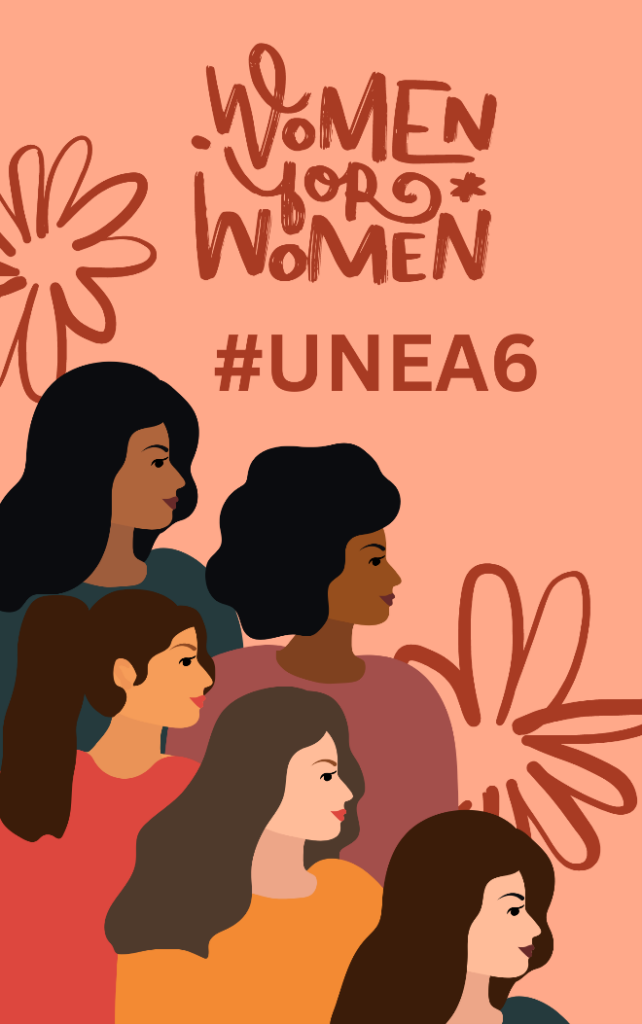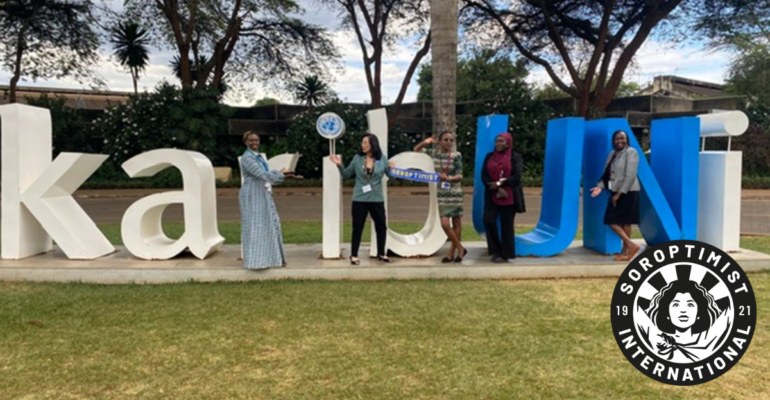Blog of Mary Muia and Habiba Alambo, SI UNEA Representatives at Nairobi.
You cannot escape it- and rightly so. Every discussion and deliberation at UNEA6 is centred on the fact that the world stands at a critical juncture, grappling with the consequences of climate change, the alarming loss of biodiversity, and escalating pollution levels. Indeed, we are in a state of crisis – a multifaceted crisis that threatens not only ecosystems but also human well-being, underscoring the imperative for unified action on a global scale.
We are in a state of crisis – a multifaceted crisis.

The Green Room side event held on the 27th of February 2024 at UNEA6 hosted by Africa Network for Animal Welfare (ANAW) piqued my interest. It focused on Civil Society’s pivotal role in negotiating and implementing multilateral agreements to combat the triple planetary crisis. As Civil Society Organisations (CSOs) champion greater women’s participation in decision-making, I’m keen on linking the plight of women and girls with efforts to enhance their well-being through active engagement.
Multiple thought-engaging presentations were given at this event – with experts such as Mr. Wachira Kariuki of ANAW highlighting areas of participation within which Civil Society’ s impact can be felt in mitigating the triple planetary crisis. He encouraged parties to engage in advocacy and lobbying, increase awareness among all actors and actively participate in the negotiation process in international meetings. He reminded attendees that Civil Society must be at the centre of Multilateral Environmental Agreements (MEAs) due to its wealth of diverse perspectives. Furthermore, all stakeholders should raise their voice as part of Civil Society – whether they choose to show up individually or collectively as coalitions, networks, and federations.
Behind the scenes of the triple planetary crisis lies another insidious challenge —the illegal donkey skin trade, an unsustainable and highly extractive practice fraught with ethical dilemmas, posing risks to animal welfare, biosecurity, and human health. Often overlooked, this trade not only inflicts suffering on innocent animals but also exploits vulnerable communities, particularly women and girls who are coerced into labour when donkeys are slaughtered or stolen. In an enlightening presentation by Anna Marry, Senior External Affairs Advisor at Brooke, it was emphasised that when donkeys are killed or stolen, women bear the burden. Ensuring stakeholder support for vital policy developments protecting working animals not only aligns with the SDGs but also boosts household incomes, diminishes poverty, enhances agricultural efficiency, provides fertiliser, and eases women’s physical labour.
It’s imperative to recognise the intrinsic links between animal welfare and environmental sustainability.

Source: Donkey owners protest the donkey skin trade in Kenya, Brooke Organisation, Accessed on 29th February 2024, from https://www.thebrooke.org/our-work/success-stories/brooke-campaigning-brings-end-donkey-slaughter-kenya
Reflecting on this Green Room event, several key takeaways emerge, shedding light on crucial lessons that resonate beyond the confines of the gathering. To begin with, let us not forget that we are currently witnessing a triple planetary crisis- one that will get worse if unified stakeholder action is not undertaken, at a global scale. Secondly, in the face of these daunting challenges, civil society emerges as a beacon of hope. Grassroots organisations, advocacy groups, and community-driven initiatives play a pivotal role in raising awareness, mobilising resources, and driving policy change – change that will mitigate the triple planetary crisis. Thirdly, it’s imperative to recognise the intrinsic links between animal welfare and environmental sustainability. The mistreatment of donkeys within the illegal trade not only compromises their well-being but also undermines ecosystem resilience and biodiversity. By integrating discussions on animal welfare into broader environmental agendas, UNEA6 can foster a more inclusive and holistic approach to addressing global challenges.
‘When donkeys are killed or stolen, women are turned into donkeys.’

There is a sense of urgency in the air at UNEA6. A sense of urgency in supporting our collective quest for global sustainability. If you do not believe that our actions today shape the world we will inherit tomorrow, an important point may have been missed. As we navigate and follow the discussions and proposals made at UNEA6, let us remember that our choices reverberate far beyond these walls. What a great time to be a part of the solution to the triple planetary crisis. As Maya Angelou once said – nothing will work unless you do. The time for action is now.

